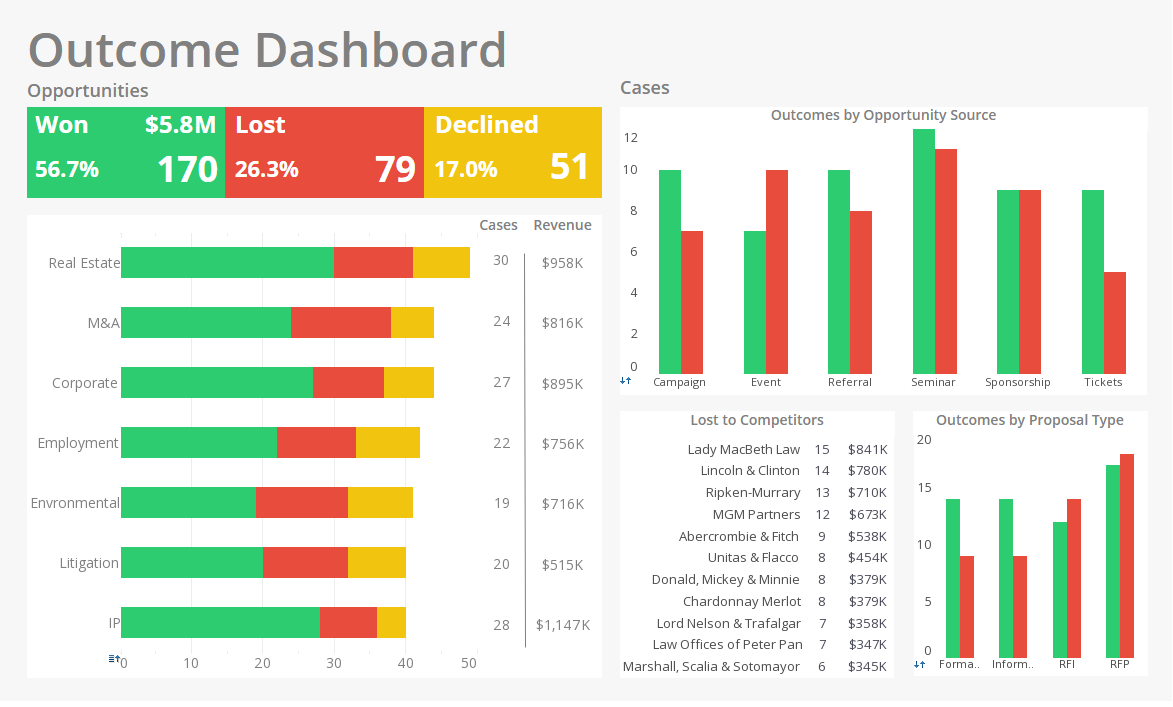Key Performance Goals
Key performance goals are the important, strategic final and intermediate outcomes that management sets for either overall corporate performance, or for departmental performance. Examples could be higher sales or higher customer satisfaction. After the goals are set, then organizations track the progress of their efforts towards these goals by monitoring the key performance indicators or KPI, the numbers that measure the current level of the metric associated with the goal.
The corresponding examples would be monthly sales figures or percent of customer who are highly satisfied. Key performance goals are split categorically. These categories are quantitative, practical, directional, actionable, and financial indicators. Quantitative indicators can be displayed as a number. Practical indicators interface with existing company processes. Directional indicators tell which way an organization is headed financially. Actionable indicators are those which can be changed. Last of all, financial indicators are used in performance measurement.
 |
View a 2-minute demonstration of InetSoft's easy, agile, and robust BI software. |
Tracking Key Performance Goals
Companies have several methods of tracking their key performance goals. InetSoft offers business intelligence software for just that purpose.
StyleBI by InetSoft is a 100% Web-based application that allows for rapid installation and unique data mashup capabilities. The intuitive drag-and-drop user interface enables reports to be tracked and recorded by pretty much anyone, not just trained IT professionals.
 |
Read why choosing InetSoft's cloud-flexible BI provides advantages over other BI options. |
What Key Performance Goals Does a Cancer Research Institute Have?
A cancer research institute typically has several key performance goals aligned with its mission to advance scientific knowledge, improve cancer treatment outcomes, and ultimately find cures for cancer. Some of the key performance goals that a cancer research institute may have include:
-
Breakthrough Discoveries: One of the primary goals of a cancer research institute is to make breakthrough discoveries in cancer biology, genetics, and treatment modalities. This includes identifying novel cancer biomarkers, elucidating molecular pathways involved in cancer development and progression, and developing innovative therapeutic strategies, such as targeted therapies and immunotherapies.
-
Translation of Research Findings into Clinical Practice: Another important goal is to translate research findings from the laboratory into clinical practice to benefit cancer patients. This may involve conducting clinical trials to evaluate the safety and efficacy of new cancer treatments, implementing evidence-based guidelines for cancer screening and diagnosis, and optimizing treatment protocols based on scientific evidence and clinical outcomes.
-
Improving Patient Outcomes: Cancer research institutes strive to improve patient outcomes by developing more effective and less toxic cancer treatments, enhancing early detection and diagnosis methods, and personalizing treatment approaches based on individual patient characteristics, such as tumor genetics and molecular profiles. The ultimate goal is to increase survival rates, improve quality of life, and reduce cancer-related morbidity and mortality.
-
Collaborative Research Partnerships: Collaboration with other research institutions, healthcare organizations, pharmaceutical companies, and patient advocacy groups is essential for advancing cancer research and achieving common goals. Cancer research institutes may set goals to establish and foster collaborative research partnerships, share data and resources, and leverage collective expertise and resources to accelerate progress in cancer research and drug development.
-
Training the Next Generation of Cancer Researchers: Cancer research institutes play a critical role in training the next generation of cancer researchers, clinicians, and healthcare professionals. They may set goals to provide comprehensive training programs, mentorship opportunities, and research experiences for students, postdoctoral fellows, and early-career researchers to cultivate talent and expertise in cancer research and healthcare delivery.
-
Obtaining Research Funding and Philanthropic Support: Securing research funding from government agencies, private foundations, and philanthropic donors is essential for sustaining cancer research initiatives and advancing scientific discoveries. Cancer research institutes may set goals to successfully compete for research grants, cultivate donor relationships, and diversify funding sources to support their research programs and initiatives.
-
Dissemination of Research Findings: Cancer research institutes aim to disseminate their research findings and scientific discoveries to the broader scientific community, healthcare professionals, policymakers, and the public. They may set goals to publish research articles in peer-reviewed journals, present findings at scientific conferences, and engage in science communication and public outreach activities to raise awareness about cancer prevention, treatment, and research advances.

